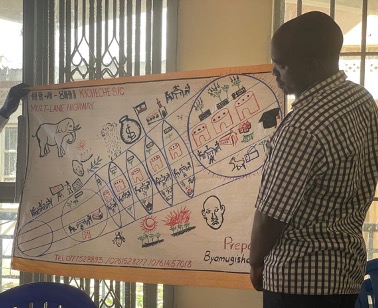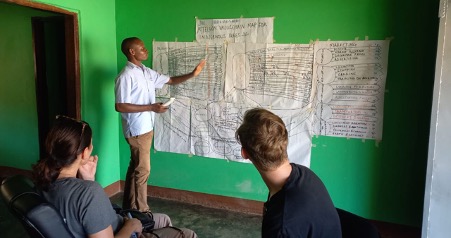Tools for Growth — Carbon Projects Beyond Trees
November 20, 2023
Alla projekt som ZeroMission arbetar med bidrar, förutom den livsviktiga klimatnyttan, också till en rad andra mervärden för de människor som deltar i eller påverkas av dem. Detta är så centralt att vi ibland pratar om t.ex. socioekonomisk nytta som en ”core-benefit”, istället för ”co-benefit” i projekten. Här berättar vår kollega Ash om sina erfarenheter av ett av projektens core-benefits i sitt projektbesök i östra Afrika tidigare i år.
Ash Farber:
“Upon visiting our Plan Vivo certified project in Uganda earlier this year, I was struck by how much activity was going on that had seemingly little to do with planting trees. Ecotrust, the project developer, appeared almost more focussed on delivering training and education to participating small holder farmers rather than getting them to dig holes and plant trees.
Two tools were being utilised, both with admirable and concrete goals. First the Multi-lane Highway used to map future goals and development at household and community level, and second the Gendered Action Learning System (aptly shortened to GALS) which is aimed at educating communities about the unequal distribution of unpaid labour.

A presentation of a community level Multi-Lane Highway from the Kicheche community, whose emblem is an elephant. They identified clean cooking solutions, increased agroforestry output and improved education to be their main goals, money from the project was a potential success factor while drought and pest infestations were potential obstacles to achieving their goals.
The Multi-lane Highway is a tool used to map growth and development plans over five years, a kind of visual SWOT analysis specially designed for groups with low or totally absent literacy skills. Few participating farmers can read or write, but after looking at their Multi-lane Highway (often drawn on old coffee sacks), the whole community can see what they want to achieve in the future, what will help them achieve that, and what could threaten it.
As farmers who have been with the project for more than 15 years will no longer receive payments for carbon sequestration, it is essential that they are given support to develop livelihood strategies that enable them to thrive with the trees still standing, and that is exactly what Ecotrust is doing.
Hearing communities speak of how they will develop their ‘enterprises’ of honey production or unionize their coffee production gave me even more confidence that people are empowered by this project, and that all the right incentives are in place for the trees to remain for generations to come. The carbon stored within the trees is there to stay as livelihood become inseparable from nature and healthy ecosystems.
The other development tool was aimed at illuminating the inequality of unpaid labour, illustrating how women are often spending their time doing tasks that receive no or little pay such as childcare or collecting firewood, while men are free to earn more money in distant markets and with greater labour opportunities.

An explanation of the Gendered Action Learning System by Mount Elgon Programme Assistant, Vincent Namisi.
Education of communities using the GALS system only began in 2023 but has had a positive impact so far. Like any social change, some communities and individuals are willing to move faster than others, but this certainly marks a step towards achieving gender equality in rural Uganda.
Having read about carbon projects and community development from books, academic publications and carbon standards, seeing the work done on the ground, the ecosystems restored, and the tools used made all those words read fit into place, and be built into a greater context. Being on the ground with the people directly involved with Trees for Global Benefits was an eye-opening experience that I will never forget.
The Plan Vivo certified project, Trees for Global Benefits, began restoring the landscapes of Uganda in 2003 with agroforestry, reforestation, and assisted natural regeneration. In the more than 20 years since it began, it has gained the participation of over 26 000 small holder farmers and won various prizes, including the UN SEED award in 2013.”
/https%3A%2F%2Fzeromission.se%2Fwp-content%2Fuploads%2F2025%2F06%2FZeroMissipon_almedalen_Take-Aways-scaled.jpeg)
/https%3A%2F%2Fzeromission.se%2Fwp-content%2Fuploads%2F2025%2F06%2FHeader_ZeroMission_Spaningar-Almedalen.png)
/https%3A%2F%2Fzeromission.se%2Fwp-content%2Fuploads%2F2025%2F06%2FZeroMission_Exponential-Roadmap_Science-Based-Targets.png)